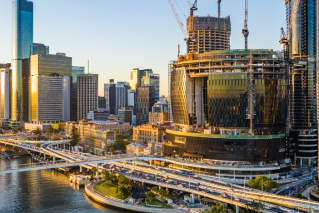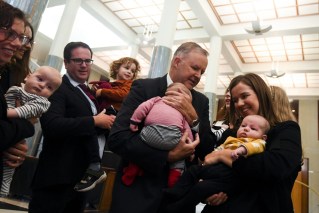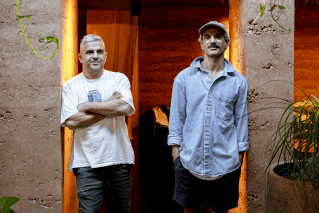Happy with your life just as it is? Unfortunately the big changes are just beginning
It’s hard to imagine a time when our world was in greater upheaval – but you’d better get used to it, writes Shane Rodgers


Singer Bono of U2 has his own thoughts about our changing society . (file image)
Some years ago, singer and activist Bono, from Irish band U2, said that when this era of history was viewed from a multi-century historical perspective, the two most significant things would be the birth of the internet and the disease crisis in Africa.
At the time it struck me that history is difficult to judge when you are living it. Will people still be playing Beatles songs in 100 years? Was the Covid pandemic a footnote in our history or a major pivot point? Have we experienced the great technology revolution, or is that still to come?
A few weeks ago, I spent many hours reading about 20 global “megatrends” reports compiled by organisations around the world over the past couple of years.
I was struck by the consistency of all the reports and a feeling that we are, indeed, in the midst of some major change that will alter the course of our world for many decades, and possibly beyond.
For the purpose of discussion, let’s call them ultratrends, that is trends that could be excessive, extreme and pivotal.
The most obvious one is climate change and how a global effort to make our civilisation more sustainable will impact every aspect of how we live. In some respects, this change is already underway. Realistically, hard carbon reduction targets mean the real change is still coming.
In the corporate world, the climate challenges are now being built into every aspect of doing business. Companies will need to develop new expertise and build sustainability into their ethos.
The PriceWaterhouseCoopers megatrends report goes as far as saying “sustainability is the lens through which a business is judged by its consumers, workforce, society and increasingly its investors”.
Coupled with the climate change imperatives is a new global focus on corporate social responsibility and the overlaying of social purpose on profit motive and business vision.
Employees are increasingly seeking out employers who have a powerful drive to improve the world and think beyond traditional corporate strategy.
In the technology space, the digital revolution started more than 30 years ago but in the 2020s it has hit a quantum-leap slip stream.
Digital is no longer an exotic animal to be studied and feared. It has infiltrated every aspect of business and personal lives, fundamentally rewriting the rulebook for doing business and communicating with consumers.
Digital skills are not just for geeks and coders. They are the new foundation literacy on which our economic future will ride.
A by-product of mass digitalisation has been the “weaponisation” of data and the creation of a cyber battleground in which digital fortresses must be constantly built and defended.
Foreign governments and highly organised and intelligent criminals are waging a sophisticated and unrelenting battle for personal and corporate information, and intelligence. Fake content can also destroy reputations and kill businesses.
Recent hacking incidents involving some of our most fundamental personal data have highlighted the importance of defending the data space, and the real risks in a world that mostly interacts in the digital universe.
Artificial intelligence and robots have been around for a long time but, so far, we have just scratched the surface. Over the next two decades any jobs that can be adequately performed by intelligent machines will inevitably move there.
Nearly two-thirds of all occupations could see a third or more of their activities automated in coming decades.
This will free up humans to do other things, ushering in major structural changes in the way we live our lives. The pandemic has already given us a hint of an underlying rethink of our priorities and our work-life expectations.
The Gallup group anticipates that, as the post-pandemic world settles in, about 25 per cent of workers will have the option to work fully remotely and 53 per cent will have the ability to split work between the office and other locations.
Economic fluctuations aside, there will be a global competition for skills for the foreseeable future and a flexible work environment will remain an important component of attracting and keeping top talent.
This brings challenges in keeping workforces connected but, in the knowledge economy at least, it will take geographic location off the table for many roles, moving us further towards a border-less international workplace.
Forces of change are accentuating the divides in our society. As people live and work longer, organisations are managing up to five generations at once in their workplaces. There has always been a generation gap but the world that the baby boomers grew up in was a vastly different place to the more recent digital natives.
The millennials (born in the later part of the 20th century) are the largest generation in history. They are quickly infiltrating and changing the corporate landscape.
This rising generation has driven two distinct classes of business – companies born in the digital age that inherently understand contemporary technology and older businesses often struggling to change and evolve in the digital age.
Converging the two classes of business may be a bumpy ride, with some collateral damage along the way.
All this is happening against some major geopolitical shifts that are making the world, and its security balance, less predictable and potentially less safe for a while. This is throwing trade relationships back into the melting pot and making supply of goods less reliable.
On the positive side, mankind is again looking to the stars and boldly seeking to go where no humans have been before. Humans will shortly be back on the moon and Mars travel will follow.
Much of this new interest in space is being driven by private corporations rather than just governments.
As we near the end of 2022, there is much to ponder. A long time ago Benjamin Franklin said: “When you’re finished changing, you’re finished.” So much of the change we saw in the past has made our lives better. There is every reason to be confident that much of the change afoot will do the same.
Shane Rodgers is a business executive, writer, strategist and marketer with a deep interest in what makes people tick and the drivers of change. Comments in this article are personal and not related to my day job.












